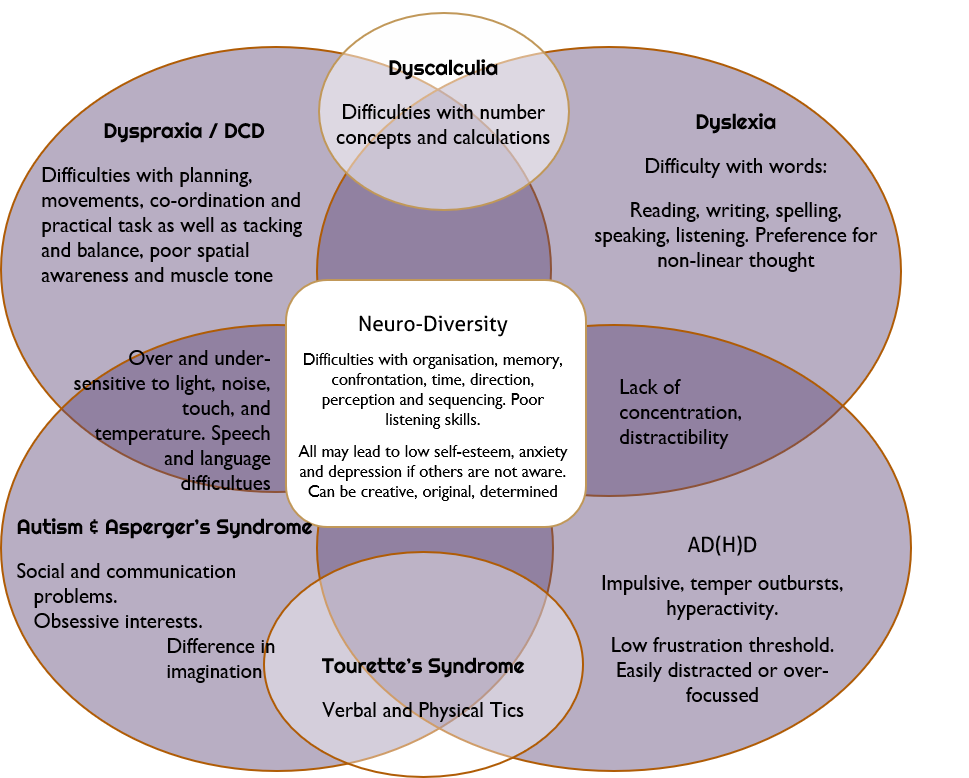Another perspective on the way we think, and act is the collection of behaviours related to differences in the way the brain processes information (Gaus, 2011). Neurodiversity is a spectrum so different people are at different levels of the different types below:

Based on the work of Mary Colley of the UK DANDA
ADHD
- Often work best under pressures, as stress increase the reduction of chemical that allow the brain to talk to each part
- Risk taking
- Boundless energy (therefore do sport to reduce the energy)
- Can be hyper-focussed and the lose interest and switch
- Failure to switch attention to tasks that need doing (. e.g. paying bills on time)
- ADHD accentuates forgetfulness
- Procrastinates – when having to organise data (e.g. messages or documents)
- Difficult to stay focused on the task at hand – too many ideas at once
- Handwriting speed is lower
- Can respond to medication
- Has difficulty sleeping: the working memory is overworked during the day therefore thoughts don’t get processed giving a backlog of unfinished work at night
Dyslexia
“Dyslexia is a specific form of language impairment that affects the way the brain encodes the phonological features of spoken words. The core deficit is in phonological processing …” (Professor Margaret Snowling)
- They confuse similar words: ‘specific’, ‘pacific’
- Affects the ability to match right letters to sounds when spelling: ‘quarrel’ vs. corral’
- It affects how to break down words into component sounds
- It affects the ability to remember verbal information
- It affects how to store and retrieve from the longer-term memory – fuzzy auditory information takes longer to get.
NLP Spelling Strategy
This is a useful technique for everyone, including those with dyslexia.
- Choose a word that you want to remember how to spell, and then write it in big letters and keep it to hand
- Think of a word that you can spell
- Move your eyes to top left, if you are right-handed (Visual recall) and make a picture of the word you know you can spell
- Bring that positive feeling into your consciousness; focus on it and enhance it take a deep breath and enhance it some more
- Have a quick glance at the word you want to remember how to spell
- Keep hold of the positive feeling, move your eyes to the top left and make a picture of the new word youwant to spell – really make it big bright and clear.
Next time you want to spell the word, move your eyes to visual recall and the word pops into your mind’s eye, and you believe you can spell.
“Yes, I am different, but I want to be accepted for whom I am,
not what society would like me to be”David Grant, “That’s the way I think”
Autistic Characteristics
Dan Silberman)
- Seeks Universal laws and objective principles
- Care’s passionately about logic
- Gift for puns and aphorisms
- Fascination with logic and complex machines
- Ability to solve problems from multiple angles
- Physical Clumsiness
- Brusque
- Flattery not effective in influencing
- Single minded focus to the point of being rude
- Rigorously logical and literal approach to life
- Doesn’t respond to peer pressure
- Tries to solve problems in intimate relations by seeking data
- Misses the socially oriented perspective
- Seeks learning for its own sake
- Socially gauche
- Naïve
- Talkative
- Intense interest in facts
- Odd
- Rude
- Self-centred
- Callous
Autistic tendencies and hobbies:
![]() Music,
Music, ![]() Science,
Science, ![]() Art,
Art, ![]() Maths and
Maths and ![]() Technology.
Technology.
(Valerie Gaus, Living Well on the Spectrum)
| Thinking | Social | Emotional | Sensor / Movement |
|
|
|
|
| Strengths | |||
|
|
|
|
| Challenge Areas | |||
|
|
|
|
Emergence of Autistic Tendencies
| What distracts me? | “Too many Sensations | “Too many Things” | “Too many Ideas” | “Too many Rules” |
| 0-8 months | 8-16 months | 16-22 months | 22 months onwards | |
| Extreme | Kanner’s Autism | OCD / OCPD | Asperger’s Syndrome | ADD |
| Focus | Regulating my sensory input by self-imposed repetition (sensory Rituals) | Regulating how I sense things by repetitive rearranging (material rituals) | Regulating how I understand ideas by repetitive mental sorting (mental rituals) | Regulating how others make me thing or feel (avoidance rituals) |
| How? | Predictable sensor repetitions (e.g. compulsive head banging, rocking, squeeze machine, etc.) | Predictable object repetitions (compulsive touching and/ or sorting of objects) | Predictable intellectual repetitions (compulsive sorting of and/or learning about ideas) | Predictable absence of repetitions (compulsive rule breaking, never being forced) |
| Feel compelled by nature to organize my sensations | Feel compelled by oneself to organize the things I sense with my sensations | Feel compelled by oneself to organize what I think about the things I sense with my sensations | Feel compelled by others to organize what others thing about the things I sense with my sensations | |
| Goal | Comfort | Neatness | Understanding | Freedom |
Source: Steven Paglierani
So what –
The key here is acceptance:
- I accept that my brain is wired differently
- I accept that there thinks I CAN do better than others, and things I can’t do
- I accept that mistakes are an inevitable part of life
- I accept that painful emotions are natural and serve a purpose
Back to